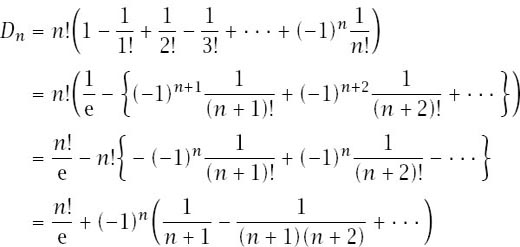Nonplussed! (14 page)
Authors: Julian Havil

we can see why. The expansion is valid for all
x
and, in particular, for
x = -
1, and at this value the identity becomes

Of course, this is an infinite series and
p
n
has only a finite number of terms but it provides a hint that e does appear in formulae for
D
n
, and perhaps the nicest example of its type is

and so

where
m
is any number such that
(Here, the
[·]
is the floor function defined by [
x
] = the greatest integer less than or equal to
x
.)
To see this, write

which means that

and pairing the terms after the first makes clear that

Now, if
n
is even, the above expression for
D
n
shows that
D
n
> n
!
/
e and so

provided that

and since
n
≥2 we require
If
n
is odd,
D
n
< n
!
/
e and now

provided that and this means that
and this means that
Take these two results together and we have the result. Of course, it can be convincingly argued that
m =
0 provides the nicest expression

